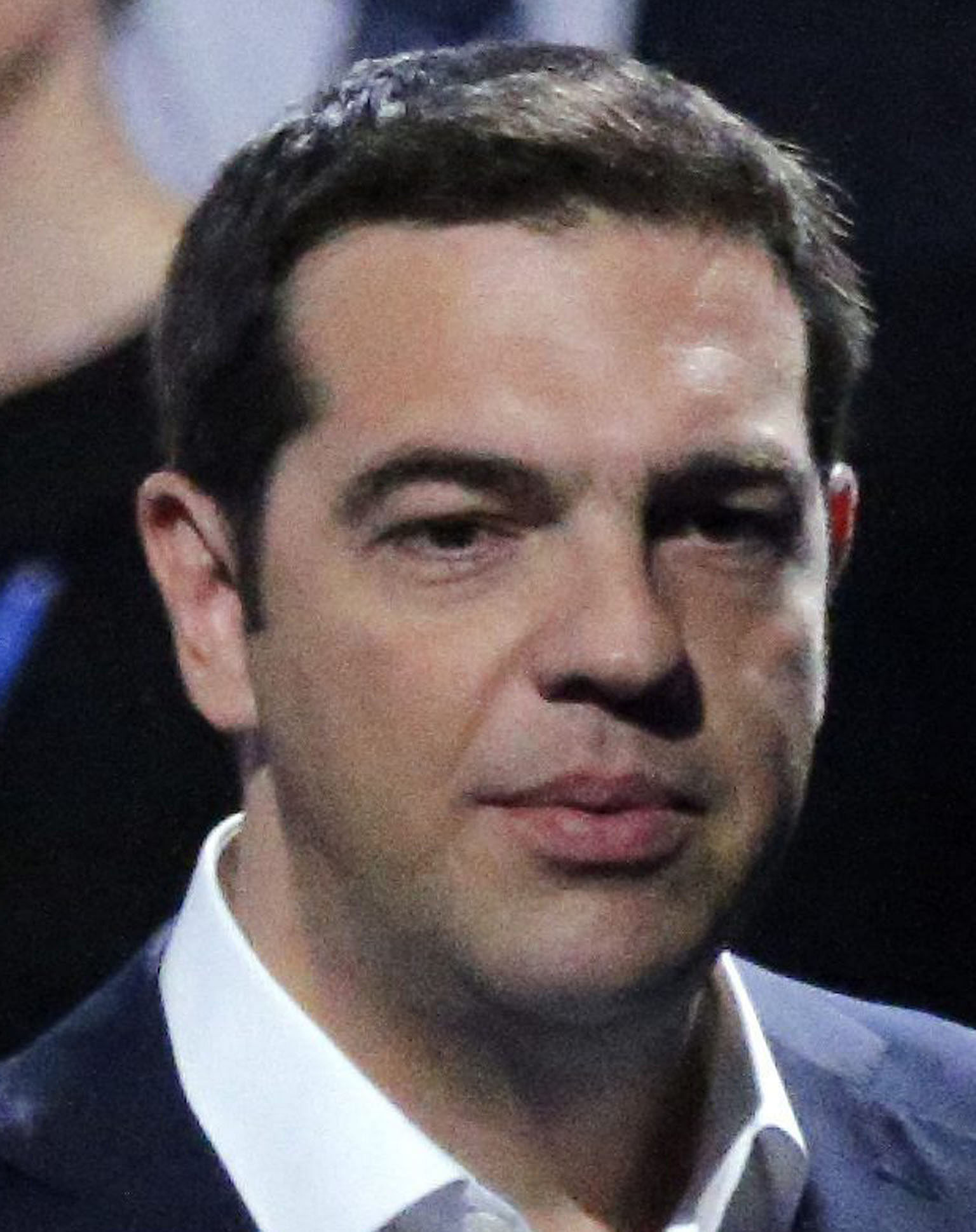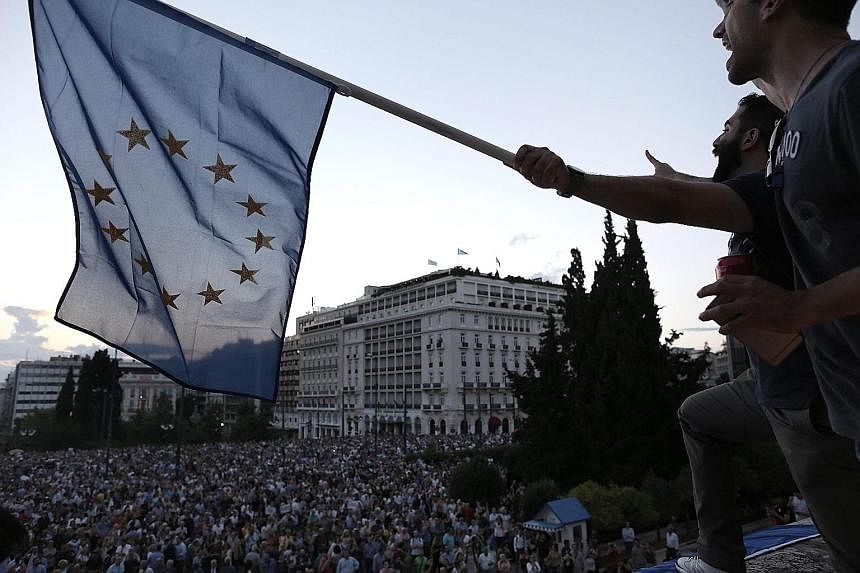ATHENS - Greece on Friday insisted a last-ditch deal on its debt was possible and dismissed "terror scenarios" of a default that is looking increasingly likely, as emergency European meetings continue in a bid to break the deadlock.
EU President Donald Tusk has also called an emergency summit of the leaders of the 19 euro zone countries in Brussels on Monday after finance ministers failed on Thursday to break the five-month deadlock between the anti-austerity government in Athens and its international creditors.
Thousands of people assembled outside the Greek Parliament in Athens on Thursday night asking for the nation to be saved after the government blamed a conspiracy to blackmail Greece for the frustration in Luxembourg.
"Those who invest in crisis and terror scenarios will be proven wrong," Prime Minister Alexis Tsipras' office said, amid reports that Greeks banks are struggling to cope with a rush of deposit withdrawals, fuelled by the ill-tempered talks with Greece's EU-IMF creditors.
French President Francois Hollande insisted yesterday that "everything" must be done to seal a compromise on the Greek debt crisis.
But the compromise must be "in line with European rules", he said following talks in Bratislava with his Slovak counterpart before speaking to German Chancellor Angela Merkel later in the day.
In a move that seemed calculated to irk other European leaders amid tensions with Russia over Ukraine, Mr Tsipras was visiting St Petersburg as the star guest at President Vladimir Putin's investment drive forum.
The Greek and Russian leaders held talks yesterday as Moscow and Athens signed a preliminary agreement to set up a joint venture to extend the TurkStream pipeline through Greece, a long-term project which the Greek government hopes will translate into an upfront payment of some sort.
Greece has until June 30 to agree to a reform deal in order to secure the remaining portion of its multi-billion euro bailout, which it needs to avoid defaulting on a debt payment of around €1.5 billion (S$2.3 billion) to the International Monetary Fund.
Analysts have long warned that a default may set off a chain of events leading to a "Grexit" - Greece leaving the euro zone.
Mr Tsipras warned in an interview with an Austrian newspaper yesterday that a Greek exit would be "the beginning of the end" of the euro.
"The famous Grexit cannot be an option either for the Greeks or the European Union. This would be an irreversible step, it would be the beginning of the end of the euro zone," he told the Kurier daily.
Mr Tsipras' own office was more conciliatory, adding in yesterday's statement: "We hope that the final negotiations take place at Europe's highest political level and we are working toward the success of this summit." The crisis has caused global worries, with the US State Department calling for all parties to reach a solution. One source described the 90-minute Eurogroup talks on Thursday as "tragic", saying that Greece had not even raised the issue of a possible bailout extension.
Creditors have refused to pay the remaining €7.2 billion of the bailout if there is no reform deal and the cash will be lost forever if there is no deal for an extension. On Wednesday, the Greek central bank warned that the cash-strapped country could crash out of the euro zone and even the European Union if it failed to reach a bailout deal. Greece owes another €6.7 billion to the European Central Bank next month and August and there have been reports of planning for possible capital controls if Greece's financial system runs dry.
AGENCE FRANCE-PRESSE, BLOOMBERG
The key players
THE Greek debt drama is nearing its climax after five years, led by a colourful cast of characters ranging from a novice prime minister keen to prove his mettle to a steely International Monetary Fund (IMF) chief set on more austerity. Here is a look at the main players:

Alexis Tsipras
Five months into the job as Greece's first radical left leader, Prime Minister Alexis Tsipras, 40, faces a seemingly impossible choice between applying his government's anti-austerity mandate and safeguarding the country's future in the euro zone.
He is under pressure from hardliners in his Syriza party, who want the government to reject the demands of Greece's European Union-IMF creditors.
Yanis Varoufakis
The wild card of the Greek debt talks, motorbike-riding Finance Minister Yanis Varoufakis, 54, has become a household name with his untucked shirts, bald pate and acerbic attacks on austerity.
After receiving intense media exposure that included a middle finger involving Germany and a controversial glossy magazine photo shoot, Mr Varoufakis has been forced to take a back seat in the talks to less provocative negotiators.

Mario Draghi
Italy's Mario Draghi, 67, heads the European Central Bank (ECB), which is not only an Athens creditor but, most crucially, maintains a financial lifeline to Greek banks.
"Super Mario", as he is dubbed by analysts, plays a key role but has been very careful not to appear too involved in the Greek crisis, insisting that the ECB "is not a political institution".
But he is under pressure, with a growing number of central bank governors beginning to question the continued support for Greece.
Angela Merkel
Europe's most powerful leader, German Chancellor Angela Merkel, 60, has put her shoulder to the wheel of negotiations in recent weeks.
A break-up of the monetary union would be a horror scenario for Dr Merkel and she is understood to be prepared to budge in the talks with Athens, but not too much.
Christine Lagarde
Stylish IMF boss Christine Lagarde, 59, has increasingly been playing "bad cop" in the negotiations with Greece.
Accused of taking a tough line, the IMF in recent weeks has pressed both the Greeks and the Europeans to take "hard decisions" - for Athens to accept new reforms, and for the Europeans to slash Greece's debt.
Jean-Claude Juncker/Jeroen Dijsselbloem
European Commission chief Jean-Claude Juncker, 60, has been a key broker in the talks with Mr Tsipras, but has seen his efforts fail so far.
The chain-smoking former Luxembourg prime minister and former head of the Eurogroup of euro zone finance ministers is a veteran of backroom Greek talks.
Mr Juncker's successor as head of the Eurogroup is Jeroen Dijsselbloem, 49, the quietly efficient Dutch Finance Minister.
It is officially up to Mr Dijsselbloem to seal any final deal with Athens, but he has clashed with Mr Varoufakis during the talks.
AGENCE FRANCE-PRESSE

